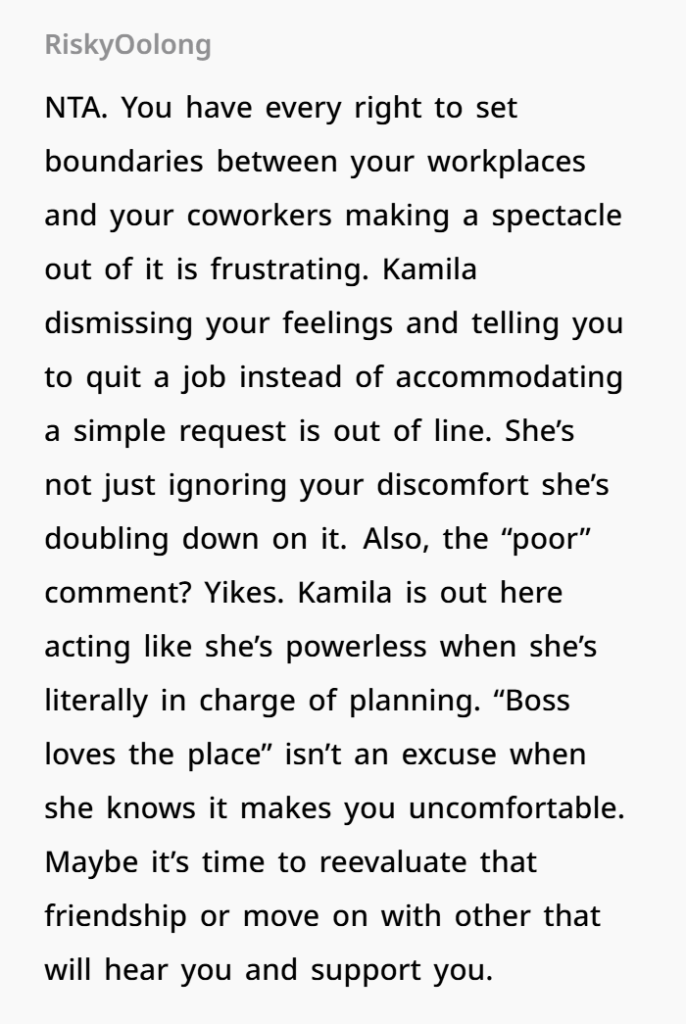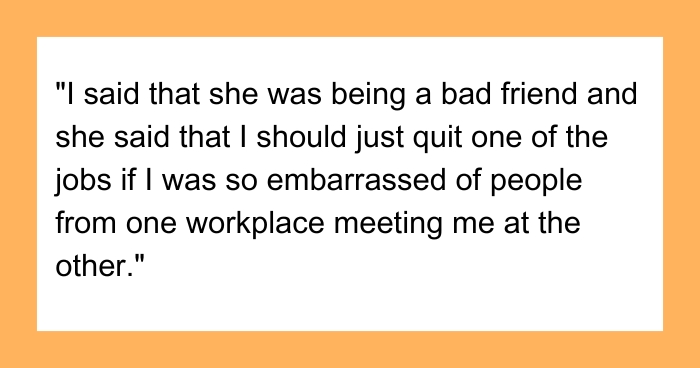Serving Both Sides: When Work Boundaries Get Blurred
In this situation, you’re juggling two jobs and trying to maintain clear boundaries between your professional spaces—a totally valid concern. You work at an office where your boss loves hosting team dinners and, coincidentally (or maybe not so coincidentally), those dinners started being held at the other job you work at—a restaurant. Initially, you brushed it off, thinking it was just a one-time thing. But when these events became routine, it forced you into an uncomfortable spot: serving your coworkers while they socialized, which not only made you feel awkward but also brought on some unwanted pity and attention.
You tried to navigate the situation respectfully by discussing it with Kamila, who plays a role in organizing these events and is someone you considered a friend. But instead of understanding your discomfort, she dismissed your feelings and made some harsh comments—especially that “poor” remark, even though she later apologized. You’re left wondering if you overreacted by asking her to stop scheduling these dinners at your restaurant and whether your frustration makes you the bad guy in this scenario.
Read for more info Reddit











Here were the top rated comments from readers in response to the OP’s post:
Your request for Kamila to stop scheduling dinners at your restaurant is completely reasonable—and here’s why. At the core, this issue boils down to professional boundaries and respect for personal space. Having two jobs doesn’t mean those two worlds should have to collide, especially when it makes you uncomfortable and disrupts your ability to do your work effectively. Studies have shown that clear work-life boundaries are crucial for mental health and job satisfaction. When those boundaries are constantly crossed—like in your case—it can lead to feelings of anxiety, stress, and a lack of control over your environment.
From a workplace etiquette standpoint, it’s generally seen as inappropriate for coworkers or employers to put an employee in a situation where they feel obligated to serve or “host” them outside of their main professional role. Even though your office dinners aren’t intended to make you uncomfortable, they are putting you in an awkward position—especially since your coworkers and supervisors seem to treat you differently afterward. That unwanted shift in how people perceive you could affect your professional reputation and future opportunities at your primary job.
As for Kamila’s behavior, her dismissive attitude and snarky comments suggest a lack of empathy. Good friends—or even just decent coworkers—should respect reasonable boundaries. Instead of understanding your discomfort, she minimized your feelings and even threw out a pretty hurtful (and classist) comment by calling you “poor.” Her later apology doesn’t erase the fact that she crossed a line. Additionally, suggesting you quit one of your jobs comes off as completely tone-deaf, especially considering how many people rely on multiple jobs to stay afloat financially.









In short, you’re not being immature for setting boundaries—you’re actually being very mature by trying to handle this professionally and respectfully. If anything, Kamila and your boss should be more mindful of how their decisions affect you. You’re not the A-hole here. In fact, you’re just trying to protect your own peace and dignity, and that’s never something to feel guilty about.

